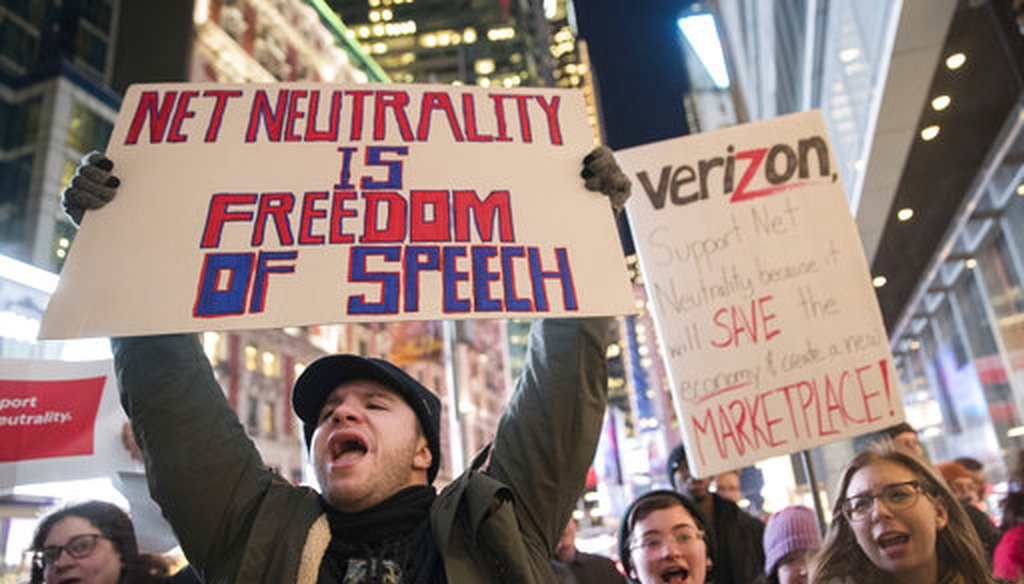Stand up for the facts!
Our only agenda is to publish the truth so you can be an informed participant in democracy.
We need your help.
I would like to contribute

Demonstrators rally in support of net neutrality outside a Verizon store, Thursday, Dec. 7, 2017, in New York. (AP Photo/Mary Altaffer)
Updated May 16, 2018, at 4:30 p.m.
The Senate passed a last-ditch measure by Democrats to rescue Obama-era Internet rules known as "net neutrality," which stops broadband providers from slowing down Internet speeds or blocking websites and apps.
The long-shot proposal cleared the Senate May 16, but faces tough odds in the House and is ultimately subject to President Donald Trump’s veto. If Democrats fail to pull off their legislative Hail Mary, net neutrality will expire June 11.
The regulation’s demise was set in motion when the Republican-majority Federal Communications Commission voted Dec. 14 to begin unraveling it.
The FCC faced fierce backlash from advocates who said net neutrality’s repeal gives the greenlight broadband providers like Comcast and Verizon to divide networks into fast lanes and slow lanes. They will also be able to throttle rivals’ streaming speeds, block content and charge websites and apps a fee to reach customers.
Sign up for PolitiFact texts
Senate Democrats, as the minority party, were able to force a floor vote on their last-gasp measure without any Republican support through a rare procedural maneuver known as a "discharge petition." The measure passed the Senate 52-47 and now proceeds to the Republican-controlled House.
Here’s what you need to know about net neutrality, and how its repeal could change the way Americans experience the Internet.
What is net neutrality?
Net neutrality makes Internet service providers treat all web traffic the same, no matter the source. The policy’s defenders say the regulations are at the heart of the idea that the Internet should be an open space where information travels freely without interference from service providers.
Under net neutrality, broadband companies are like passive conduits of data rather than content managers. When a customer pays Comcast or Verizon for Internet service, they’ve can expect to connect with equal access to any website, whether big or small.
If a broadband provider interferes — either by slowing or blocking access to certain websites, discriminating against content or charging companies fees to deliver data at faster rates — net neutrality gives FCC the power to slap on fines.
In sum, net neutrality are rules, backed by sanctions, that ensure all Internet content be treated equally by the companies we pay to get online.
How did the FCC’s vote change the rules?
The FCC voted on Dec. 14 to kill net neutrality and unravel an Obama-era move that placed broadband regulation on a stronger legal footing.
Here’s the quick-and-dirty backstory: In 2015, following a legal setback, the FCC changed the way it classified broadband Internet in order to preserve net neutrality protections. By reclassifying broadband as a "common carrier" — akin to airlines, telephone and electricity companies that have to serve everyone — the FCC solidified its authority to regulate Internet access providers and enforce net neutrality.
But the FCC’s recent vote reverts broadband back to its previous status as an "information service," and effectively removes the FCC’s power to create or enforce net neutrality protections.
Who benefits by repealing net neutrality?
Repeal could increase Internet service companies’ bottom line. Looser regulations free up broadband providers to engage in the kind of financial arrangements that were barred under net neutrality.
With the restrictions gone, Internet service providers can offer a website faster and more reliable delivery of its content in exchange for a fee. A broadband provider can also raise the transmission speed of its own content relative to that of its competitors. Broadband providers will also be free to block sites they find objectionable, which could open them up to political and public pressure.
Like their cable television cousins, broadband providers will gain more freedom to create tiered service packages, charging customers higher fees for premium services, or a different mix of options at various price points, including plans that block users from instant messaging apps, video sites, Skype or other services.
Repeal advocates have long argued that higher profits will lead broadband providers to invest more in infrastructure, which could make high-speed Internet more widely available in underserved places, like rural America (though some experts say net neutrality’s effects on infrastructure investment is an open question).
Repeal has been favored by telecom giants like AT&T and Verizon, who favor less government regulation.
Who stands to lose under repeal?
Defenders of net neutrality say dismantling the current rules is anathema to a free and open Internet, and hurts online companies and consumers alike.
Consumers could see the price of their Internet feed go up for access to sites like Netflix, which rely on high-speed and reliable connections to deliver the kind of seamless streaming content customers have come to expect. If Netflix has to pay for the fast lane, it could pass the cost onto customers.
Tech giants like Facebook and Google have spoken out against repeal, saying it would allow broadband providers to manipulate access as a way to play favorites.
Finally, net neutrality proponents warn that undoing the rules could give an unfair advantage to big corporations that can afford priority access, while squeezing out startups and smaller websites. They argue this could hurt innovation; companies like Etsy and Pinterest may never have become the household names they are today without a free and open Internet.
Net neutrality advocate Ryan Singel, a media and strategy fellow at Stanford Law's Center for Internet and Society, said the FCC’s dismantling of net neutrality means abandoning its traditional role as the protector of Americans’ right to choose which sites and apps they access.
"The FCC wants to put the greatest free market for innovation and free speech the world has ever seen at risk, simply to let companies like Verizon and Comcast to make more money," Singel said. "It's radical, rushed and unpopular across the political spectrum."
What happens next?
At this rate, net neutrality is slated to end June 11. In a statement announcing the policy’s end date, FCC Chairman Ajit Pai said the forthcoming repeal would usher out "unnecessary and harmful Internet regulations."
But the policy’s defenders refuse to let net neutrality die without a fight. In addition to the measure before the Senate, a group attorneys general from 23 states filed a lawsuit in February to block the repeal. That litigation is pending.
Meantime, major telecommunications companies have promised that customers’ experiences would not be different without these regulations. Though only time will tell how the Internet might change if the regulatory dismantling goes forward as expected.
Our Sources
PolitiFact, "What is net neutrality?" Nov. 13, 2014
New York Times, "Net Neutrality Repeal: What Could Happen and How It Could Affect You," Nov. 21, 2017
The Hill, "New York AG to sue FCC over net neutrality repeal," Dec. 14, 2017
Fast Company, "The Main Argument For Rolling Back Net Neutrality Is Pretty Shaky," April 28, 2017
AT&T statement on FCC’s repeal proposal, Nov. 21, 2017
Interview with Kevin Howley, professor of media studies at DePauw University, Dec. 11, 2017
Email interview with Ryan Singel, media and strategy fellow at Stanford Law School’s Center for Internet and Society, Dec. 12, 2017












































